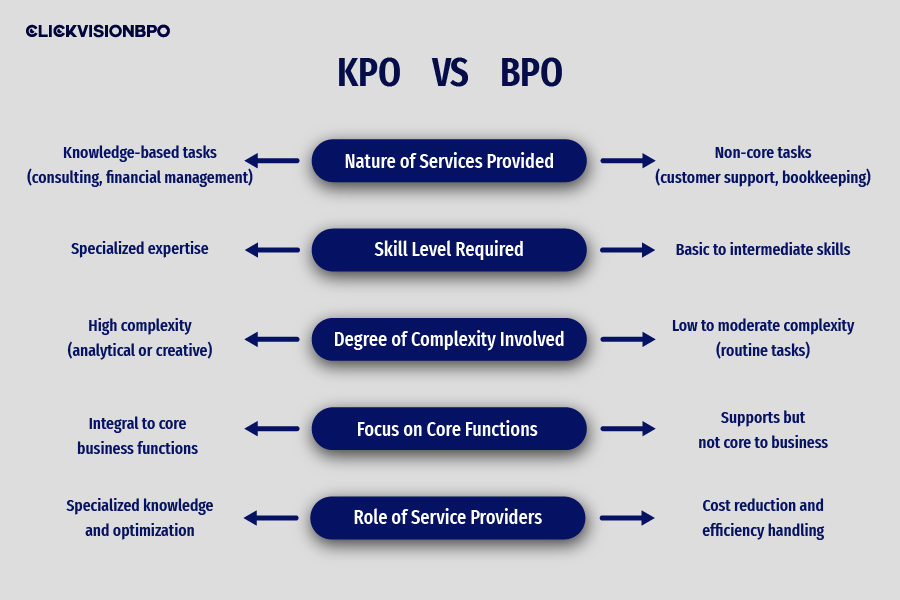If you are looking for outsourcing services, you might be wondering what all those different services offer and which one may be the best one for your company. Given the high volume of providers offering outsourcing services, it’s challenging to find the right provider on the market. Based on extensive research, we found KPO and BPO to be among the most preferred services by healthcare and finance businesses. But what’s the deal with KPO vs BPO, and how do they differ?
KPO and BPO services confuse even experienced marketers or executives, which is why we decided to create a comprehensive comparison of BPO vs KPO.
Before we start
Let’s briefly define BPO and KPO to make sure we’re on the same page and then proceed to the comparison part in detail. Both KPOs and BPOs are outsourcing services. As you may know by now, outsourcing is a business model that allows companies to hire a third party to reduce costs, gain expertise from the employees, or improve efficiency.
BPO stands for Business Process Outsourcing. It’s a branch of outsourcing that involves hiring a third-party provider for various outsourcing services. Typically, the services under BPO include customer support, technical support, administration, etc. But we will explain in more detail below.
KPO is short for Knowledge Process Outsourcing. As a subset of BPO, KPO includes offering services to individuals with extensive knowledge and expertise in a specialized area. Usually, they may be legal, analytic, market, design, marketing, or other services where a formal background is needed.
Now that we’ve established the definitions, we can put KPO vs BPO for comparison.
KPO vs BPO: Key Differences
Although both are outsourcing services, KPO and BPO are fundamentally different. BPO services involve outsourcing non-core business functions to specialized BPO vendors at a lower cost but with greater efficiency.
KPO, on the other hand, is the outsourcing of core, business-related functions. More specifically, KPO deals with more advanced analytical and technical skills. For that reason, KPO looks for individuals with extensive knowledge, judgment, and expertise in a particular area.
The difference between the two lies in the complexity of the challenges and the level of skills and experience.
There are many other aspects that divide KPO and BPO services.
Nature of Services Provided
The nature of BPO services is non-core processes. Therefore, the BPO services are oriented around easy tasks that take too much time to complete, such as:
- Customer support
- Bookkeeping
- Account payable clerk
- Data collector
KPO services are based on knowledge and expertise. Therefore, the service provider in the KPO role has to possess a specific set of skills, experience, or other additional training. They offer advice and solutions to problems the company cannot solve without experts in the field. So, some of the common KPO jobs are:
- Consultant
- Medical assistant
- Financial management
- Technical data analyst
- Project manager
Skill Level Required
Although equally demanding, both KPO and BPO require different sets of skills.
For example, a KPO insurance expert must be familiar with the rules and regulations of the insurance to provide help to the clients.
Unlike KPO, a BPO employee requires minimal to intermediate training or skill sets depending on the task. Typically, the BPO service provider has to have basic computer knowledge and normal communication skills. However, that doesn’t mean that the job is less demanding.
Quite the contrary, a BPO task usually comes in volumes, and it usually requires a hardworking and disciplined person to handle the responsibility. These employees are ready to handle any number of calls or messages online within a given timeframe.
Degree of Complexity Involved
In terms of the degree of complexity, the duty of a KPO is far more complex than a BPO. Companies investing in KPO do not only look for ways to reduce their costs by hiring third parties, but they also need some kind of advice or expertise on a given topic or problem. Therefore, the KPOs are involved in the decision-making process, and their call is integral to the company’s overall development.
The KPO tasks vary in complexity. They can be analytical or creative. For example, in the creative KPO services, the outsourced parties may need to develop a creative strategy to drive the business forward. It can be a campaign, bringing new leads through content strategies, raising brand awareness, etc. To deliver positive results, the employee must have in-depth knowledge in the field.
BPO outsourced employees, on the other hand, have low-level complexity tasks they need to complete. Usually, these are routine tasks that do not require any specific skill except for being diligent and completing the task within the given timeframe.
Focus on Core Functions
As mentioned earlier, companies hire KPO employees because they need their expertise and knowledge. Therefore, the function of a KPO employee is business-core, as their input is relevant in the decision-making processes.
Additionally, they have more responsibility, as they must possess the required skills and knowledge relevant to their job. The tasks are more complex and require a special set of skills. For example, the healthcare industry needs administrative tasks like medical coding. This job requires a skilled and experienced person to determine the right billing codes for the treatment. The person must be familiar with the healthcare industry and have a financial background to complete these tasks.
BPO tasks are less complex, and the person doesn’t necessarily need to have an academic degree. However, it’s important to know basic to intermediate computer skills, probably the Microsoft suite. They may need to handle calls, chat with customers, or send emails. There are many tasks that companies must complete to retain positive relationships with customers, such as being constantly responsive and solving your clients’ problems etc. However, they are not a priority compared to the other issues going on in the company.
Moreover, BPO employees usually have a set of rules and processes with clear instructions from their managers that they must follow. This is not the case with the KPO employees. KPO employees are expected to exercise more judgment instead of following orders.
The Role of Third-Party Service Providers
Both third-party service providers have a crucial role in the business functions. Besides bringing their knowledge or preparedness to the table, they also offer other benefits that are valuable to the business. That includes reduced expenses, improved efficiency in the workflow, and quality of their overall operations.
KPOs bring a lot to the table. Their primary role is to optimize the workflow or company performance for which businesses need specific skill sets. Besides the knowledge, skills, and experience, you can even leverage the location of the BPO provider. For example, a European BPO offers market insights to a US or UK-based company. The company can use their insight and strategize their next moves.
Additionally, with expertise in data analytics or management systems, KPO outsourced employees improve the company’s technological infrastructure. They will introduce new concepts to amplify the efficiency in the overall workflow without you having to invest in training new hires.

Benefits of KPO and BPO
Before we wrap up the article, let’s go over the main benefits of hiring KPO or BPO services.
- Simplify complex tasks– as KPOs are knowledge-based professionals with formal educational backgrounds and experience in the business, they can easily tackle some of the complex tasks in the company. Or you can divide the complex assignments and improve efficiency. Similarly, BPOs simplify tasks in a way that relieves the workload of the in-house team, or they take care of the paperwork, client calls, or complete documentation for the clients.
- Boosts scalability– both KPO and BPO provide businesses with scalability and flexibility in their operations. By outsourcing some core or non-core tasks, companies adjust the amount of work based on their current needs. It takes on the burden of maintaining a large in-house workforce.
Based on these benefits, we implement the BPO in our company. It’s super convenient and allows your company to grow. Our newest addition to the set of services is the BPOs for the healthcare and insurance industry. That includes process optimization, medical billing and coding, end-to-end outsourcing services, and much more.
Feel free to contact us for any questions, dilemmas, or other inquiries you may have. We’d be happy to help!

Source: freepik.com / Photo Contributor: tsyhun
Conclusion
To conclude this KPO vs BPO comparison review, we want to point out the main difference between the KPOs and BPOs.
Essentially, BPOs are concerned with more administrative tasks, and they have different workloads of work to do. Unlike BPOs, KPOs are based on knowledge and expertise, and their skills are relevant to the company’s growth.
The main differences are in terms of the nature of services, skills, and education, the level of complexity of the tasks, and the focus of the core functions. All in all, BPOs offer non-core business functions, whereas KPOs have core business functions. We can conclude that both are fundamentally different but equally relevant.
If KPOs strategize the moves, BPOs execute the plan. If both parties offer quality work, your company can benefit greatly from this business model.

With a strong background in the marketing industry and healthcare leadership roles, Filip is responsible for CLICKVISIONBPO’s sales strategies and onboarding new clients. With a passion for sharing insights gained from his experience, he also shares valuable knowledge through industry related articles.
